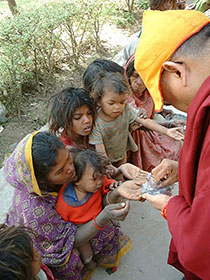- Home
- FPMT Homepage

Foundation for the Preservation of the Mahayana Tradition
The FPMT is an organization devoted to preserving and spreading Mahayana Buddhism worldwide by creating opportunities to listen, reflect, meditate, practice and actualize the unmistaken teachings of the Buddha and based on that experience spreading the Dharma to sentient beings. We provide integrated education through which people’s minds and hearts can be transformed into their highest potential for the benefit of others, inspired by an attitude of universal responsibility and service. We are committed to creating harmonious environments and helping all beings develop their full potential of infinite wisdom and compassion. Our organization is based on the Buddhist tradition of Lama Tsongkhapa of Tibet as taught to us by our founders Lama Thubten Yeshe and Lama Thubten Zopa Rinpoche.
- Willkommen
Die Stiftung zur Erhaltung der Mahayana Tradition (FPMT) ist eine Organisation, die sich weltweit für die Erhaltung und Verbreitung des Mahayana-Buddhismus einsetzt, indem sie Möglichkeiten schafft, den makellosen Lehren des Buddha zuzuhören, über sie zur reflektieren und zu meditieren und auf der Grundlage dieser Erfahrung das Dharma unter den Lebewesen zu verbreiten.
Wir bieten integrierte Schulungswege an, durch denen der Geist und das Herz der Menschen in ihr höchstes Potential verwandelt werden zum Wohl der anderen – inspiriert durch eine Haltung der universellen Verantwortung und dem Wunsch zu dienen. Wir haben uns verpflichtet, harmonische Umgebungen zu schaffen und allen Wesen zu helfen, ihr volles Potenzial unendlicher Weisheit und grenzenlosen Mitgefühls zu verwirklichen.
Unsere Organisation basiert auf der buddhistischen Tradition von Lama Tsongkhapa von Tibet, so wie sie uns von unseren Gründern Lama Thubten Yeshe und Lama Thubten Zopa Rinpoche gelehrt wird.
- Bienvenidos
La Fundación para la preservación de la tradición Mahayana (FPMT) es una organización que se dedica a preservar y difundir el budismo Mahayana en todo el mundo, creando oportunidades para escuchar, reflexionar, meditar, practicar y actualizar las enseñanzas inconfundibles de Buda y en base a esa experiencia difundir el Dharma a los seres.
Proporcionamos una educación integrada a través de la cual las mentes y los corazones de las personas se pueden transformar en su mayor potencial para el beneficio de los demás, inspirados por una actitud de responsabilidad y servicio universales. Estamos comprometidos a crear ambientes armoniosos y ayudar a todos los seres a desarrollar todo su potencial de infinita sabiduría y compasión.
Nuestra organización se basa en la tradición budista de Lama Tsongkhapa del Tíbet como nos lo enseñaron nuestros fundadores Lama Thubten Yeshe y Lama Zopa Rinpoche.
A continuación puede ver una lista de los centros y sus páginas web en su lengua preferida.
- Bienvenue
L’organisation de la FPMT a pour vocation la préservation et la diffusion du bouddhisme du mahayana dans le monde entier. Elle offre l’opportunité d’écouter, de réfléchir, de méditer, de pratiquer et de réaliser les enseignements excellents du Bouddha, pour ensuite transmettre le Dharma à tous les êtres. Nous proposons une formation intégrée grâce à laquelle le cœur et l’esprit de chacun peuvent accomplir leur potentiel le plus élevé pour le bien d’autrui, inspirés par le sens du service et une responsabilité universelle. Nous nous engageons à créer un environnement harmonieux et à aider tous les êtres à épanouir leur potentiel illimité de compassion et de sagesse. Notre organisation s’appuie sur la tradition guéloukpa de Lama Tsongkhapa du Tibet, telle qu’elle a été enseignée par nos fondateurs Lama Thoubtèn Yéshé et Lama Zopa Rinpoché.
Visitez le site de notre Editions Mahayana pour les traductions, conseils et nouvelles du Bureau international en français.
Voici une liste de centres et de leurs sites dans votre langue préférée
- Benvenuto
L’FPMT è un organizzazione il cui scopo è preservare e diffondere il Buddhismo Mahayana nel mondo, creando occasioni di ascolto, riflessione, meditazione e pratica dei perfetti insegnamenti del Buddha, al fine di attualizzare e diffondere il Dharma fra tutti gli esseri senzienti.
Offriamo un’educazione integrata, che può trasformare la mente e i cuori delle persone nel loro massimo potenziale, per il beneficio di tutti gli esseri, ispirati da un’attitudine di responsabilità universale e di servizio.
Il nostro obiettivo è quello di creare contesti armoniosi e aiutare tutti gli esseri a sviluppare in modo completo le proprie potenzialità di infinita saggezza e compassione.
La nostra organizzazione si basa sulla tradizione buddhista di Lama Tsongkhapa del Tibet, così come ci è stata insegnata dai nostri fondatori Lama Thubten Yeshe e Lama Zopa Rinpoche.
Di seguito potete trovare un elenco dei centri e dei loro siti nella lingua da voi prescelta.
- 欢迎 / 歡迎
简体中文
“护持大乘法脉基金会”( 英文简称:FPMT。全名:Foundation for the Preservation of the Mahayana Tradition) 是一个致力于护持和弘扬大乘佛法的国际佛教组织。我们提供听闻,思维,禅修,修行和实证佛陀无误教法的机会,以便让一切众生都能够享受佛法的指引和滋润。
我们全力创造和谐融洽的环境, 为人们提供解行并重的完整佛法教育,以便启发内在的环宇悲心及责任心,并开发内心所蕴藏的巨大潜能 — 无限的智慧与悲心 — 以便利益和服务一切有情。
FPMT的创办人是图腾耶喜喇嘛和喇嘛梭巴仁波切。我们所修习的是由两位上师所教导的,西藏喀巴大师的佛法传承。
繁體中文
護持大乘法脈基金會”( 英文簡稱:FPMT。全名:Found
ation for the Preservation of the Mahayana Tradition ) 是一個致力於護持和弘揚大乘佛法的國際佛教組織。我們提供聽聞, 思維,禪修,修行和實證佛陀無誤教法的機會,以便讓一切眾生都能 夠享受佛法的指引和滋潤。 我們全力創造和諧融洽的環境,
為人們提供解行並重的完整佛法教育,以便啟發內在的環宇悲心及責 任心,並開發內心所蘊藏的巨大潛能 — 無限的智慧與悲心 – – 以便利益和服務一切有情。 FPMT的創辦人是圖騰耶喜喇嘛和喇嘛梭巴仁波切。
我們所修習的是由兩位上師所教導的,西藏喀巴大師的佛法傳承。 察看道场信息:
- FPMT Homepage
- News/Media
-
- Study & Practice
-
-
- About FPMT Education Services
- Latest News
- Programs
- New to Buddhism?
- Buddhist Mind Science: Activating Your Potential
- Heart Advice for Death and Dying
- Discovering Buddhism
- Living in the Path
- Exploring Buddhism
- FPMT Basic Program
- FPMT Masters Program
- FPMT In-Depth Meditation Training
- Maitripa College
- Lotsawa Rinchen Zangpo Translator Program
- Universal Education for Compassion & Wisdom
- Online Learning Center
-
- Prayers & Practice Materials
- Overview of Prayers & Practices
- Full Catalogue of Prayers & Practice Materials
- Explore Popular Topics
- Benefiting Animals
- Chenrezig Resources
- Death & Dying Resources
- Lama Chopa (Guru Puja)
- Lama Zopa Rinpoche: Compendium of Precious Instructions
- Lama Zopa Rinpoche: Life Practice Advice
- Lama Zopa Rinpoche Practice Series
- Lamrim Resources
- Mantras
- Prayer Book Updates
- Purification Practices
- Sutras
- Thought Transformation (Lojong)
- Audio Materials
- Dharma Dates - Tibetan Calendar
- Translation Services
- Publishing Services
- Ways to Offer Support
- Prayers & Practice Materials
-
- Teachings and Advice
- Find Teachings and Advice
- Lama Zopa Rinpoche Advice Page
- Lama Zopa Rinpoche: Compendium of Precious Instructions
- Lama Zopa Rinpoche Video Teachings
- ༧སྐྱབས་རྗེ་བཟོད་པ་རིན་པོ་ཆེ་མཆོག་ནས་སྩལ་བའི་བཀའ་སློབ་བརྙན་འཕྲིན།
- Podcasts
- Lama Yeshe Wisdom Archive
- Buddhism FAQ
- Dharma for Young People
- Resources on Holy Objects
- Teachings and Advice
-
-
*If a menu item has a submenu clicking once will expand the menu clicking twice will open the page.
-
-
- Centers
-
- Teachers
-
- Projects
-
-
-
-
*If a menu item has a submenu clicking once will expand the menu clicking twice will open the page.
-
-
- FPMT
-
-
-
-
-
Your up and down emotions are like clouds in the sky; beyond them, the real, basic human nature is clear and pure.
Lama Thubten Yeshe
-
-
-
- Shop
-
-
-
The Foundation Store is FPMT’s online shop and features a vast selection of Buddhist study and practice materials written or recommended by our lineage gurus. These items include homestudy programs, prayers and practices in PDF or eBook format, materials for children, and other resources to support practitioners.
Items displayed in the shop are made available for Dharma practice and educational purposes, and never for the purpose of profiting from their sale. Please read FPMT Foundation Store Policy Regarding Dharma Items for more information.
-
-
FPMT News Around the World
9

Lama Yeshe’s famous teaching style is fully present in this book, according to the book’s editor, Ven. Robina Courtin: “His words are not only experiential but also direct, funny, deceptively simple, and incredibly encouraging—enlightenment seems possible.”
Here Lama Yeshe explains mahamudra in the book’s opening chapter:
According to Tibetan Buddhism, mahamudra is one of the most advanced teachings of the Buddha. Mahamudra is Sanskrit: maha means “great” and mudra can be translated as “seal.” When you lend me one hundred dollars, we make a contract and we seal it, don’t we? It shows: “Next year I have the obligation to pay you back.” You have the document as a guarantee.
However, this seal, this great seal, is not a physical seal made in a factory. It is the universal reality of emptiness, nonduality, non–self-existence. It exists in all phenomena, including sentient beings. It is also not some made-up philosophical concept. It doesn’t matter whether you accept it or deny it. If I say, “I don’t believe there is an earth; I don’t believe there is a sun,” who cares? Even though I reject the existence of the sun, I’m standing in the rays of the sun. Even though I deny the existence of the earth, I’m standing on the earth.
The reality of nonduality is inescapable. It is the inborn nature of all phenomena. It exists equally in all things: organic, nonorganic, permanent, impermanent, including all beings. It exists always within us. The name we give it is mahamudra.
Learn more about and order Mahamudra: How to Discover Our True Nature by Lama Yeshe on Wisdom Publications’ website:
https://wisdomexperience.org/book/mahamudra-0
You can also order Mahamudra: How to Discover Our True Nature from the FPMT Foundation Store:
https://shop.fpmt.org/Mahamudra–How-to-Discover-Our-True-Nature_p_3130.html
FPMT.org and Mandala Publications brings you news of Lama Zopa Rinpoche and of activities, teachings, and events from over 160 FPMT centers, projects, and services around the globe. If you like what you read, consider becoming a Friend of FPMT, which supports our work.
- Tagged: book excerpts, lama yeshe, mahamudra, wisdom publications
7

The Elephant’s Secret Kitchen, Cafe at Jamyang, London, UK, September 2018. Photo by Louis Porter.
Cafe at Jamyang, an initiative of Jamyang Buddhist Centre London, is situated in the heart of the Elephant and Castle neighborhood in London, UK. The Cafe joined together with the University of the Arts London, London College of Communication to produce a cookbook, The Elephant’s Secret Kitchen. Ilaria Mezzogori, chef/managing director, Cafe at Jamyang, and author of the cookbook shares the story.
In April 2017 we took off for a journey. It’s now September 2018, and we have reached land.
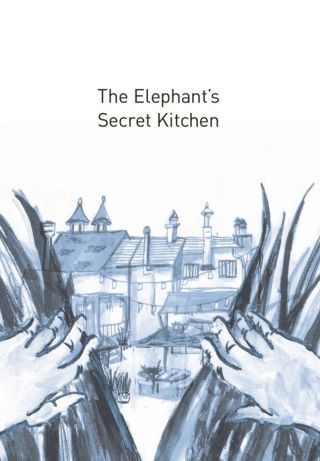
The Elephant’s Secret Kitchen, London, UK, September 2018. Photo by Shana Pagano.
In this past year we have cooked food, written down recipes, taken pictures, drawn illustrations, brewed colors, and printed paper.
Then on September 11, a few dozen cardboard boxes were delivered to our Cafe in Elephant and Castle. And we could finally say, “Our book is here!”
Many times during a busy lunchtime, I would hear the same question over the Cafe counter: “When are you making a recipe book?”
Once I forgot to say, “We don’t really have the time.” Instead I asked, “Shall we make it together?”
And so it was that Cafe at Jamyang and the London College of Communication started this journey.
The Cafe offered the recipes and stories that had passed through its kitchen and that needed to be preserved. The College provided its rooms, paper, and ink, while its students and tutors brought the recipes and and stories to life with images and color.
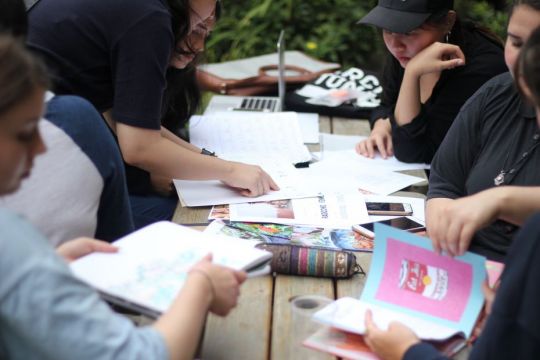
University of the Arts London, London College of Communication students working on The Elephant’s Secret Kitchen, Cafe at Jamyang, London, UK, August 2017. Photo by Alissa Metchnik.
The Elephant’s Secret Kitchen was printed using an eco-friendly paper created by a recycling process far more advanced than the standard on the Heidelberg lithography press at London College of Communication.
Learn more about Cafe at Jamyang, and purchase The Elephant’s Secret Kitchen on the cafe’s website:
http://www.cafeatjamyang.co.uk/
FPMT.org and Mandala Publications brings you news of Lama Zopa Rinpoche and of activities, teachings, and events from over 160 FPMT centers, projects, and services around the globe. If you like what you read, consider becoming a Friend of FPMT, which supports our work.
- Tagged: cafe at jamyang, cookbook, ilaria mezzogori, jamyang buddhist centre, the elephants secret kitchen, university of the arts london
31
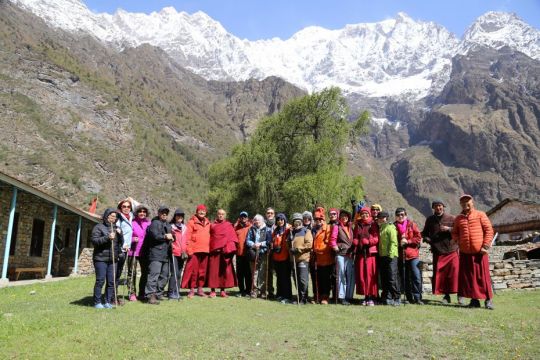
Leaving from Rachen Nunnery for the first hike, to Milarepa Cave of Doves, Tsum, Nepal, May 2018. Photo by Tsum pilgrimage participant.
In May 2018 a group of twenty-two pilgrims, including Losang Dragpa Center resident teacher Geshe Jampa Tsundu, Tsum Project coordinator and former Rinchen Jangsem Ling secretary Low Yuet Kiew (“YK”), and FPMT Southeast Asia regional coordinator Selina Foong traveled together to Tsum, Nepal. This is an excerpt from Selina’s recently published online story, Pilgrimage to the Hidden Valley of Tsum, Nepal.
Our second day dawned bright and clear, and we joined the nuns in their daily Tara puja before setting off on our first hike.
First up, Milarepa’s Cave of the Doves! Here, dakinis had transformed into doves in order to listen to the Dharma from Milarepa. There were three separate but adjacent parts—a meditation gompa, a small cave with his very clear footprint on a large rock, and another small gompa with holy statues.
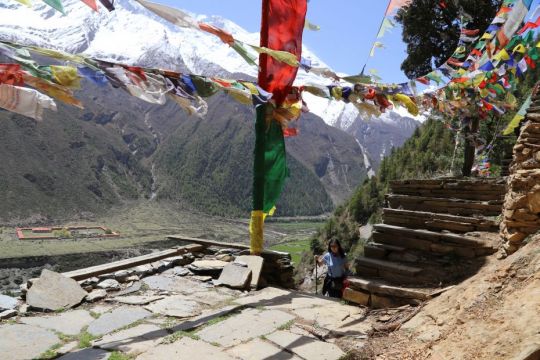
Arriving at Milarepa’s Cave of the Doves, Tsum, Nepal, May 2018. Photo by Tsum pilgrimage participant.
How moving to peer out from those dim tiny spaces towards the endless snowy peaks beyond, and realize that the great saint Milarepa would have done much the same centuries ago, as he meditated on the nature of reality! Galvanized and inspired, I recalled this beautiful line from Calling the Lama from Afar: “Magnificently glorious guru, please bless me to abide one-pointedly in practice in isolated places, not having any hindrances to my practice.”
On our way down, we stopped at another holy cave. Here, the great yogi Geshe Lama Konchog had meditated. Gazing at the piles of stones and then further into the darkness, the tranquility was palpable.
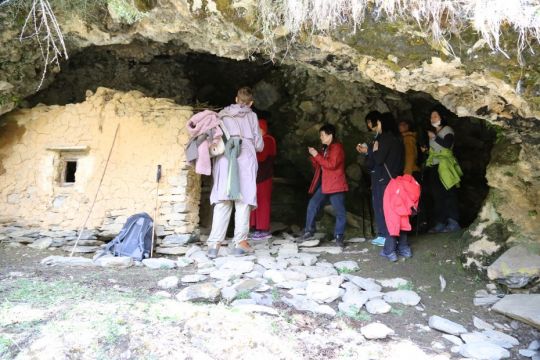
Visiting Geshe Lama Konchog’s retreat cave below Milarepa’s Cave of Doves, Tsum, Nepal, May 2018. Photo by Tsum pilgrimage participant.
As it turned out, these holy places had a way of suspending the normal passage of time in more ways than one. As we trekked back and looked at our watches, we were suddenly startled. What was to have been an easy walk this morning had turned into a five-hour expedition! Whoops! Blame it on all the posing and photos!
Read Selina’s full online story, Pilgrimage to the Hidden Valley of Tsum, Nepal:
https://fpmt.org/mandala/in-depth-stories/pilgrimage-to-the-hidden-valley-of-tsum-nepal/
Read Lama Zopa Rinpoche’s advice for pilgrimage:
https://fpmt.org/wp-content/uploads/teachers/zopa/advice/Pilgrimage_Advice.pdf
FPMT.org and Mandala Publications brings you news of Lama Zopa Rinpoche and of activities, teachings, and events from over 160 FPMT centers, projects, and services around the globe. If you like what you read, consider becoming a Friend of FPMT, which supports our work.
- Tagged: geshe jampa tsundu, geshe lama konchog, mu monastery, nepal, pilgrimage, rachen nunnery, selina foong, tsum, tsum project, tsum valley
26
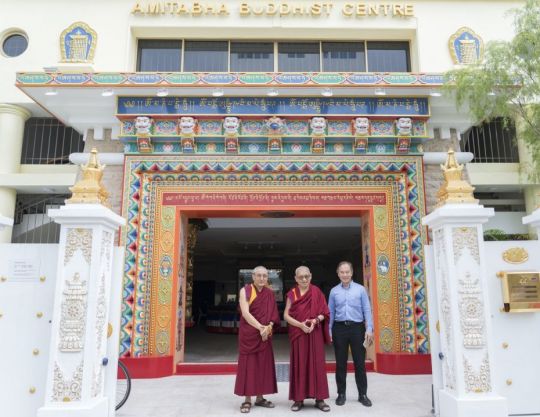
Khen Rinpoche Geshe Thubten Chonyi, Lama Zopa Rinpoche, and Tan Hup Cheng in front of Amitabha Buddhist Center’s new entrance painted by Peter Griffin, Singapore, September 2018. Photo by Ven. Lobsang Sherab.
Lama Zopa Rinpoche arrived in Singapore on September 10, 2018, where he was greeted by a large group of students at the airport. Rinpoche spent the following three weeks leading activities at FPMT center Amitabha Buddhist Centre. The program ended on September 29 with a long life puja for Rinpoche. Shila Gephel, a long-time student of Lama Zopa Rinpoche, shares the story.
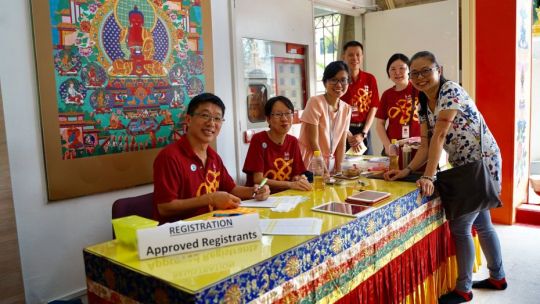
Kelvin Lee, Doris Lim , Toh Su Fen, Tan Wee Meng, Sandra Chen, and Ong Cheng Cheng at the Amitabha Buddhist Centre registration table, Singapore, September 2018. Photo by Tan Seow Kheng.
Lama Zopa Rinpoche’s presence at Amitabha Buddhist Centre galvanized both old and new students, many who had come from different parts of the world, including Mongolia, Spain, Italy, Britain, Taiwan, and neighboring Malaysia.
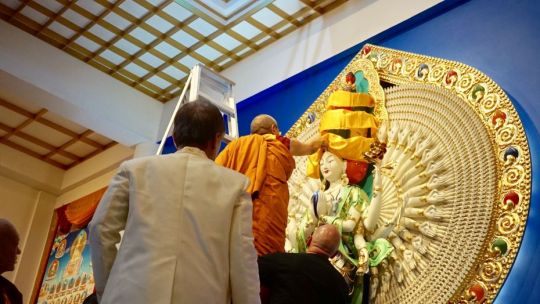
Lama Zopa Rinpoche and Tan Hup Cheng watching Khen Rinpoche Geshe Thubten Chonyi offer the golden crown to the Chenrezig statue at Amitabha Buddhist Centre, Singapore, September 2018. Photo by Tan Seow Kheng.
The program started on September 13 with Rinpoche offering the newly finished golden crown to the Chenrezig statue in the main gompa and taking time to explain about the incredible benefits of offering to holy objects. “It is exactly the same as having made offerings to the actual Buddha or Chenrezig, and that means also exactly the same as offering to His Holiness the Dalai Lama.”
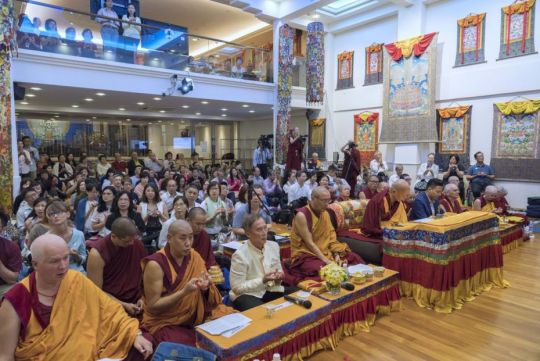
Lama Zopa Rinpoche making offerings to Chenrezig during the golden crown offering ceremony at Amitabha Buddhist Centre, Singapore, September 2018. Photo by Ven. Lobsang Sherab.
Watch the short video, A Thousand Hands – The Wish Fulfilled, by Ven. Tenzin Tsultrim:
https://youtu.be/98Z0Px5aL1o
Rinpoche continued in the days after to give mind-training teachings, an Amitabha Obtaining the Pure Land initiation, and extensive Lama Chopa commentary. Rinpoche said that so many holy beings actualized the Lama Chopa and that this teaching has not degenerated; it is still warm with blessing.
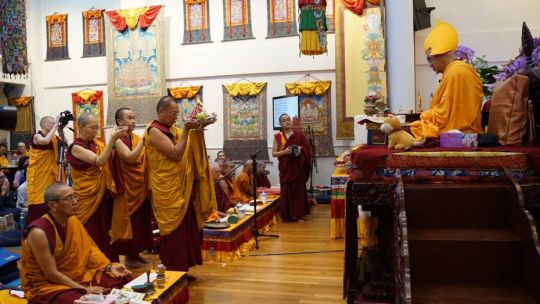
Ven. Tenzin Tsultrim, Ven. Gyalten Rabten, and Ven. Tenzin Drachom making the offering to Lama Zopa Rinpoche during Lama Chopa at Amitabha Buddhist Centre, Singapore, September 2018. Photo by Tan Seow Kheng.
Rinpoche also reminded us that “if one doesn’t get to practice Dharma, learn Dharma, actualize the true path, wisdom directly realizing emptiness, then we will cycle again endlessly in samsara, suffering. The most important answer is to want to benefit others, that is the real answer.”
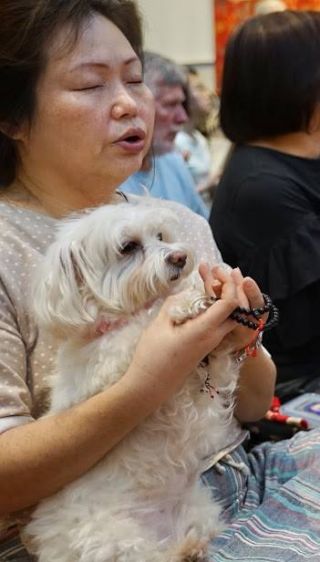
Wong Lai Kuen and Jangchup, named by Lama Zopa Rinpoche, during the tsog puja at Amitabha Buddhist Centre, Singapore, September 2018. Photo by Tan Seow Kheng.
To the people attending the South East Asian Regional Meeting, Rinpoche spoke about the Masters Program and Basic Program that are being taught in the centers and the importance of doing retreat after study. “Even if one is able to actualize one lamrim realization, it is so worthwhile.”
Rinpoche then said how his wish now is for FPMT students to develop lamrim experiences more and more, and that the most important thing for FPMT’s success is to have good samaya with His Holiness the Dalai Lama, Lama Yeshe, and Rinpoche.
A long life puja was offered to Rinpoche on the last day of the program with Rinpoche reminding us again about “how important it is to practice the bodhisattva attitude so all your actions are dedicated for sentient beings.”
In these three blessed weeks, the center was filled to capacity as humans and pets alike imbibed the unending wisdom of the holy guru and rejoiced at the collection of dreamlike merits.
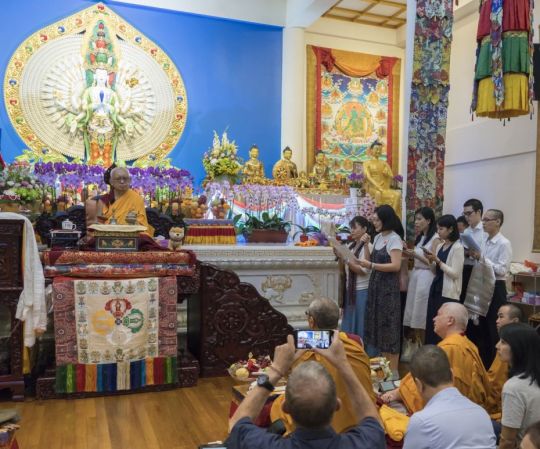
The Amitabha Buddhist Centre choir singing Lama Zopa Rinpoche’s long life prayer to Rinpoche, Singapore, September 2018. Photo by Ven. Lobsang Sherab.
Watch a short video created by Alaric, Heather, and Qiping that captures the highlights of Rinpoche’s visit:
https://youtu.be/JP7-v5PxcKk
To learn more about Amitabha Buddhist Centre, visit their website:
http://www.fpmtabc.org/
View the photo album of Rinpoche’s visit to Singapore:
https://fpmt.org/teachers/zopa/gallery/singapore-september-2018/
Watch Lama Zopa Rinpoche teach LIVE from Spain, Germany, and Switzerland, October 19-November 18! For links to live video streams:
https://fpmt.org/media/streaming/lama-zopa-rinpoche-live/
Find complete videos of Lama Zopa Rinpoche’s recent teachings, including from Singapore:
https://fpmt.org/media/streaming/teachings-of-lama-zopa-rinpoche/
FPMT.org and Mandala Publications brings you news of Lama Zopa Rinpoche and of activities, teachings, and events from over 160 FPMT centers, projects, and services around the globe. If you like what you read, consider becoming a Friend of FPMT, which supports our work.
- Tagged: amitabha buddhist centre, khen rinpoche geshe chonyi, lama zopa rinpoche, shila gephel, tan seow kheng, ven. tenzin tsultrim
23
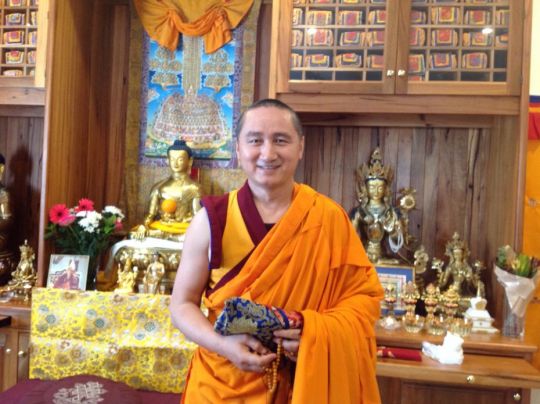
Geshe Tenzin Zopa at Tara Meditation Center, Burnbury, Western Australia, September 2018. Photo by Julie Halse.
Geshe Tenzin Zopa visited FPMT center Tara Meditation Center in Bunbury, Western Australia, from September 1-2, 2018. Fran Steele, spiritual program coordinator, shares about the visit.
On Saturday, September 1, Geshe Tenzin Zopa taught about how to care compassionately for the dying person.
Geshe-la stressed the importance of correct motivation, of kindness at all moments. Often we act as carers doing a job, or out of obligation.
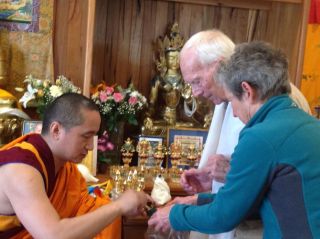
Geshe Tenzin Zopa, Robert, and Beth at Tara Meditation Center, Burnbury, Western Australia, September 2018. Photo by Julie Halse.
He then talked about the need for mindfulness, using his brother’s care of Geshe Lama Konchog as his example.
To care well we can’t come from a place of thinking, but from the heart that is in tune with the other person’s needs. We cannot be concerned about showing the person our Buddhist way, rather to simply listen, and help them connect with their own inner peace.
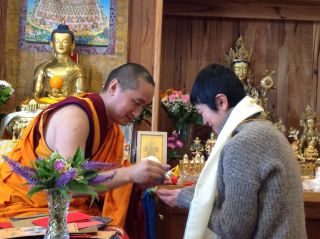
Geshe Tenzin Zopa and Naomi at Tara Meditation Center, Burnbury, Western Australia, September 2018. Photo by Julie Halse.
The extreme delicacy of those final moments as the mind propels us from the ‘hallucinations’ of this life to the next ‘hallucination’ was brought home vividly. It is a great responsibility to care for a loved one at this time.
The following day, Geshe-la talked about compassionate dying from the perspective of the person who is dying. We can use our death to create compassion in ourselves for those around us, so that our mind is filled with compassion when we die. Alternatively, we can use meditation on emptiness to prepare us to use the clear light wisely.
Many in the audience did not have tantric initiation so Geshe-la based his explanation of the stages of dying on what is said in sutra. The emphasis is on preparing our mind in the Bodhisattva path now before we are faced with the pain and confusion that occurs at the time of death.
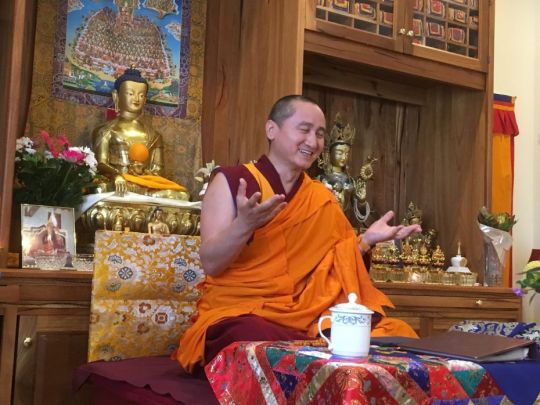
Geshe Tenzin Zopa at Tara Meditation Center, Burnbury, Western Australia, September 2018. Photo by Julie Halse.
In response to a question, Geshe-la explained the importance of reliance on a guru as refuge.
He also described how to set up the environment, get help or give help with practices and mantra and what might be helpful after death, such as laying Namgyalma mantra on the body and blessing ashes.
This is only a fraction of all the wonderful wisdom we were given, and I finished hoping that Geshe-la would come back and continue the story of what to do between death and the next rebirth.
For more information about Tara Meditation Center, visit their website:
http://hmt.org.au/
For additional advice on death and dying, visit:
https://fpmt.org/death/
FPMT.org and Mandala Publications brings you news of Lama Zopa Rinpoche and of activities, teachings, and events from over 160 FPMT centers, projects, and services around the globe. If you like what you read, consider becoming a Friend of FPMT, which supports our work.
17
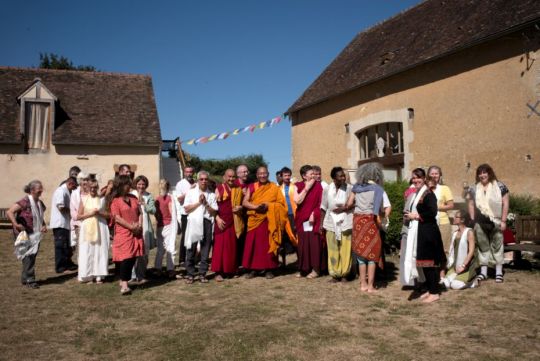
Dagri Rinpoche with Geshe Drakpa Tsundue, Ven. Thubten Donyo, Ven. Elisabeth Drukier, and students, Kalachakra Centre’s retreat facility, France, August 2018. Photo by Charles Ho.
In order to give Kalachakra Centre students the opportunity to deepen their understanding of Buddhism and go further in their practice, the FPMT Paris-based center acquired a large farm in Perche in northwest France. Student Christa Muller-Rappard shares details about the retreat facility, a two-hour direct train ride from Paris, and Dagri Rinpoche’s recent visit.
The sun is shining hot and bright over Kalachakra Centre’s retreat facility, Saint Cosme en Vairais retreat centre. The sound of a tractor breaks the silence as it comes nearer; the birds and crickets sing their songs.
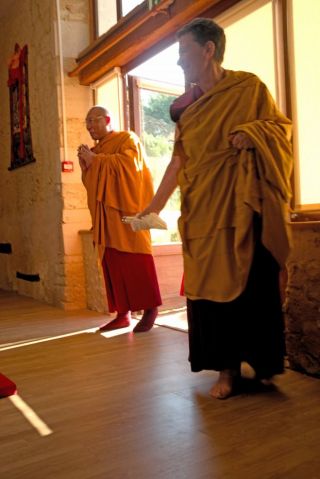
Dagri Rinpoche and Ven. Elisabeth Drukier at Kalachakra Centre’s retreat facility, France, August 2018. Photo by Charles Ho.
A big country house with a joyful and bustling kitchen and dining area welcomes you. Moving beyond this area, a beautiful wooden gompa is revealed. It is in stark contrast to what came before, like the transition between the mundane and the spiritual.
One is held in awe, surrounded by exquisite hand-painted thangkas. They beautify the stone and adobe walls with their bucolic and rustic charm, reminiscent of a time long gone.
The robe-colored cushions invite one to be seated. A certain calm takes over because of the palpable reverberation of thousands of mantras, prayers, and aspirations of the holy beings, buddhas, and lamas who have graced this space.
A wooden staircase leads upstairs to a bright and airy corridor with several dormitories.
Kalachakra Centre’s retreat facility, inaugurated by Lama Zopa Rinpoche, has been beautifully renovated. It is quiet and beautiful, spacious and cozy. In addition to the big country house, there are three other buildings on the land. These buildings are for guests and retreat participants. It is also possible to camp on the grounds around the center.
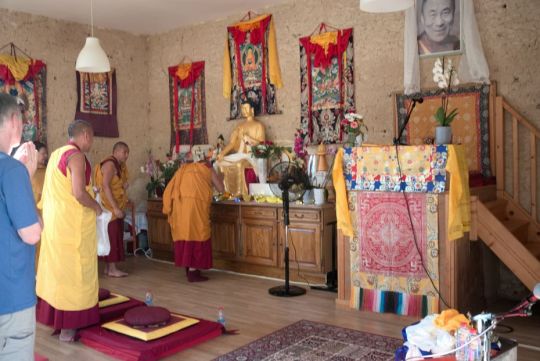
Dagri Rinpoche at Kalachakra Centre’s retreat facility, France, August 2018. Photo by Charles Ho.
The retreat facility offers annual one-month lamrim teachings given by Venerable Jamphel Gyaltsen, a resident at Nalanda Monstery, as well as a Vajrasattva retreat, Kalachakra retreat, and Shamatha retreat.
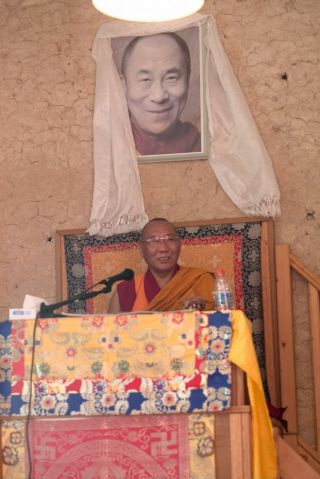
Dagri Rinpoche at Kalachakra Centre’s retreat facility, France, August 2018. Photo by Charles Ho.
This year Kalachakra Centre was incredibly fortunate to receive Dagri Rinpoche at its retreat facility. Rinpoche kindly taught us for several days in August 2018. His visit marked the retreat facility’s ten-year anniversary.
With his usual good humor and incredible kindness, Rinpoche gave us commentaries on Langri Tangpa Dorje Senghe’s famous text, The Eight Verses of Thought Transformation, as well as Vajrasattva and Tara initiations, offering us all immense benefits and clarity.
The retreat finished with a beautiful tsog offering with Kalachakra Centre’s resident geshe, Geshe Drakpa Tsundue in attendance.
Most of the students came from Paris, where they are regular students at Kalachakra Centre.
Dagri Rinpoche had not come for nine years, but he was very happy to recognize some old faces. We hope he can visit us again soon.
For more information about Kalachakra Centre in Paris and its retreat facility, visit their website:
https://www.centre-kalachakra.com/#
The Eight Verses of Mind Training is available from the FPMT Foundation Store:
https://fpmt.org/edu-news/eight-verses-of-thought-transformation/
FPMT.org and Mandala Publications brings you news of Lama Zopa Rinpoche and of activities, teachings, and events from over 160 FPMT centers, projects, and services around the globe. If you like what you read, consider becoming a Friend of FPMT, which supports our work.
9
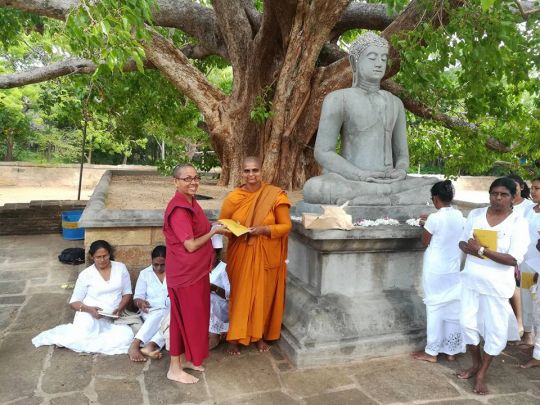
Reciting the Suwarnoththaba Sutra, the Sinhala version of the Golden Light Sutra at Abayagirya stupa, Anuradhapura, Sri Lanka, August 2017. Photo courtesy of Ven. Tenzin Lekdron.
Ven. Tenzin Lekdron, Tara Lanka Study Group coordinator, rents a flat in Kandy, Sri Lanka, and regularly travels to Colombo to help the community. She shares an update from Sri Lanka.
Three years ago, I landed back in my home country of Sri Lanka. It had been an unplanned return driven by the earthquake that struck while I was staying at Khachoe Ghakyil Ling Nunnery in Nepal. Before that I had been newly ordained in India by His Holiness the Dalai Lama. I lived eighteen years in Australia, where I met Lama Zopa Rinpoche and the Golden Light Sutra.
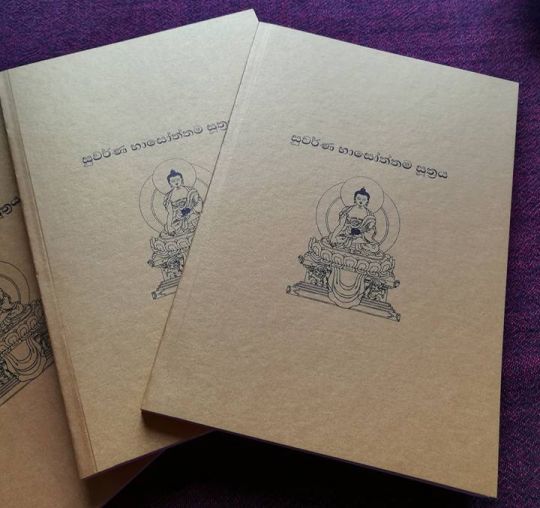
The Suwarnoththaba Sutra, the Sinhala version of the Golden Light Sutra, Sri Lanka, September 2017. Photo courtesy of Ven. Tenzin Lekdron.
In Sri Lanka, I’m an oddity; a Sri Lankan nun but in robes that are unlike anything else in the country. We have an FPMT Study Group called Tara Lanka.
There are probably around fifty people who have connected with Tara Lanka Study Group in various parts of the country where I have given talks and performed sutra and Medicine Buddha pujas and so on. Those people are from various strata of society.
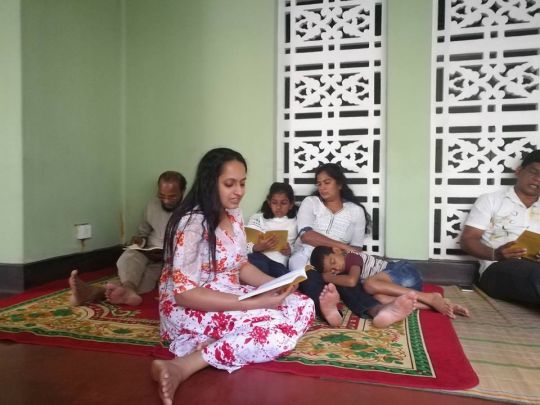
Reciting the Suwarnoththaba Sutra, the Sinhala version of the Golden Light Sutra, Kandy, Sri Lanka, January 2017. Photo courtesy of Ven. Tenzin Lekdron.
Life is very harsh for most of the people here, so the focus is on purification and trying to help wherever it is practical.
In July 2018 FPMT registered teacher Ven. Birgit Schweiberer came to Tara Lanka Study Group for three weeks. She generously funded herself to come out from Austria and give commentary on the Golden Light Sutra.
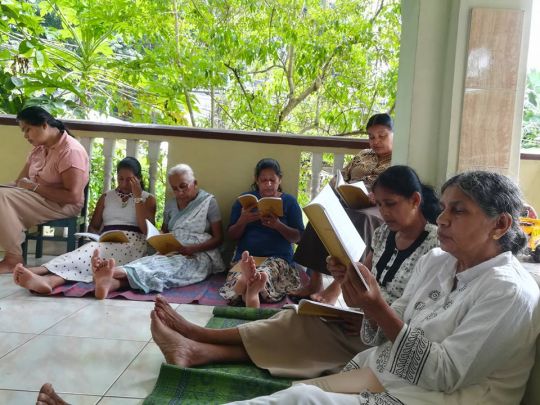
Completing thirty-six recitations of the Golden Light Sutra as an offering to Lama Zopa Rinpoche, Aranayaka, Sri Lanka, November 2017. Photo courtesy of Ven. Tenzin Lekdron.
There are some great stories about results we’ve had from reciting the Golden Light Sutra.
Lama Zopa Rinpoche talks about freeing suffering pretas through giving them Dharma. In June 2017 I led a family in a recitation of the Golden Light Sutra at their home. This recitation was an interesting one. The lady of the house was being urged by spirits to keep reciting the Golden Light Sutra. Fingers crossed that the spirits have migrated to a better rebirth.
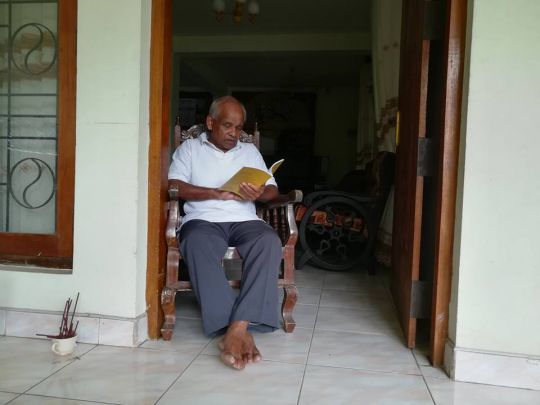
Completing thirty-six recitations of the Golden Light Sutra as an offering to Lama Zopa Rinpoche, Aranayaka, Sri Lanka, November 2017. Photo courtesy of Ven. Tenzin Lekdron.
To learn more about Tara Lanka Study Group, visit their website:
http://taralanka.org
Learn about and download the Golden Light Sutra by visiting the FPMT website:
https://fpmt.org/education/prayers-and-practice-materials/sutras/golden-light-sutra/
Lama Zopa Rinpoche is the spiritual director of the Foundation for the Preservation of Mahayana Tradition (FPMT), a Tibetan Buddhist organization dedicated to the transmission of the Mahayana Buddhist tradition and values worldwide through teaching, meditation, and community service.
- Tagged: golden light sutra, sri lanka, tara lanka study group, ven. birgit losang drime, ven. tenzin lekdron
3
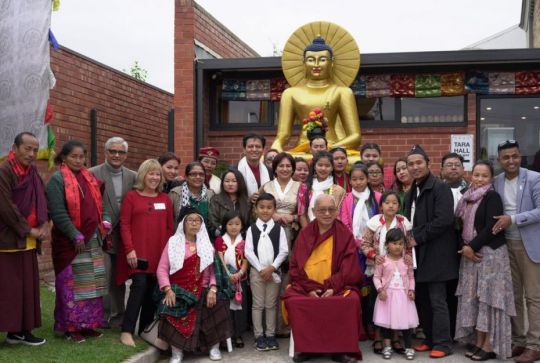
Association of Himalayan Buddhists of South Australia (AHIMBSA) and Lyndy Abram at Buddha House, South Australia, May 2018. Photo courtesy of Buddha House.
Lyndy Abram, center director of Buddha House, an FPMT center located in a suburb of Adelaide, South Australia, shares about the center’s friendship with the Himalayan Buddhist community of South Australia.
Last September we received a request from the Association of Himalayan Buddhists of South Australia (AHIMBSA) for a blessing from our then-resident teacher, Geshe Konchog Kyab. About forty people of all ages came to Buddha House for the visit. They were very excited to meet with a lama. I decided to follow up with the AHIMBSA representatives to see what we could do to help them.
It turned out there are 3,500 Himalayan refugees living in the northern suburbs of Adelaide. They have been coming here since 2008, and it is a growing community. They told us that they had lived most of their lives in refugee camps in Nepal and had previously been in Bhutan. They told stories of torture and having been in solitary confinement, chained, for years. Some of the people who directly experienced this were at the meeting. They told us they had not had access to any Buddhist teachings due to the circumstances of being a refugee.
The Board of Buddha House agreed we should partner with their community, offering teachings for the adults and the children, and whenever a visiting teacher comes to involve them in the visit.
Our friendship with them is growing. A large number of AHIMBSA members came to Buddha House in May 2018 for the opening of our new location, where they met Lama Zopa Rinpoche. Some of the children sang a national song as part of the ceremony.
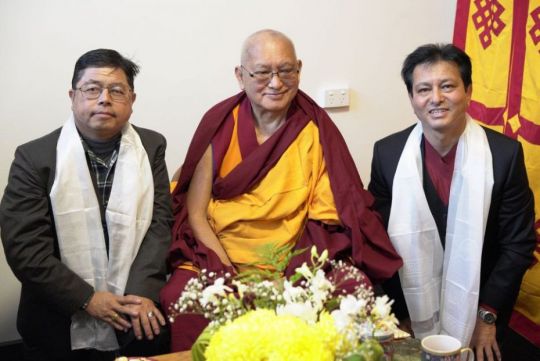
Bahadur Gurung, AHIMBSA chairman, and Jogen, translator, having afternoon tea with Lama Zopa Rinpoche, South Australia, May 2018. Photo courtesy of Buddha House.
Rinpoche had afternoon tea with Bahadur Gurung, AHIMBSA’s chairman, and Jogen, translator, and they shared their stories with him. Rinpoche said to them it is much better for you to practice Dharma here than it was in Nepal, because in the refugee camps you did not have access to Dharma teachings.
Buddha House wants to ensure we help AHIMBSA as much as possible. We are so fortunate to have the Dharma, as well as the freedom to practice, attend teachings, and spend time with the Dharma community. Meeting them and hearing their stories has helped us understand our good fortune.
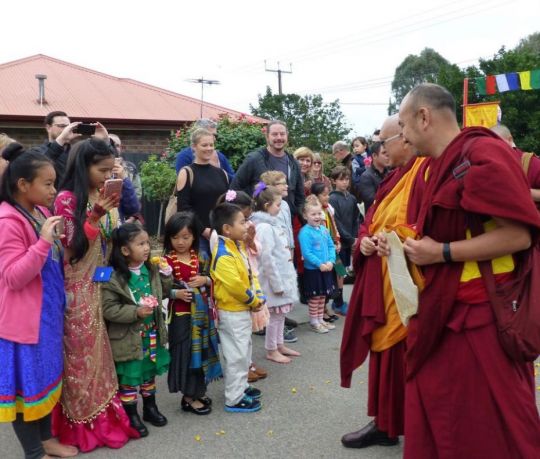
AHIMBSA youth and Buddha House Dharma Kids Club greet Lama Zopa Rinpoche at Buddha House, South Australia, May 2018. Photo courtesy of Buddha House.
They would particularly like help with the children, which we are able to do through providing a Dharma club. Ven. Dondrub and myself go to a hall AHIMBSA hires monthly. I run a Dharma club for kids class then Ven. Dondrub gives a Dharma talk to the adults. Since many community members do not speak English, they provide a Nepali translator for him.
AHIMBSA really wants help with their young adults. I asked Geshe Tenzin Zopa, who has met with them twice now for teachings and blessings, what they might do. He suggested doing activities teenagers want to do—outings, camps—and then introduce Dharma topics in a setting they feel comfortable in.
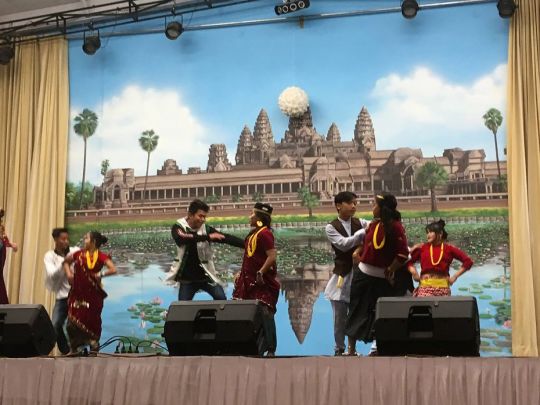
AHIMBSA youth performance at AHIMBSA’s second anniversary celebration, Cambodian Buddhist Hall of Salisbury, South Australia, July 2018. Photo courtesy of Buddha House.
In July 2018 AHIMBSA celebrated its second anniversary by throwing a celebration held at the Cambodian Buddhist Hall of Salisbury. They invited Buddha House representatives to a joyous day of entertainment, and to honor the lives of their elders. Three women in their nineties were given certificates of honor and were covered in blessing scarves and shawls by the local members of parliament.
They honored people from organizations who help their community which included myself, representing Buddha House. The children were given blessing strings and mantra cards which were a gift from Rinpoche.
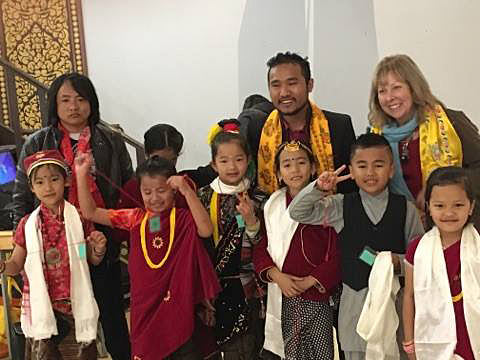
Lyndy Abram with AHIMBSA youth at AHIMBSA’s second anniversary celebration, Cambodian Buddhist Hall of Salisbury, South Australia, July 2018. Photo by Janne Graham.
The young people performed cultural, Bollywood, and modern-style dances. There were also music performances, and a meal and chai were given to the more than 1,000 people in attendance. It was a wonderful day.
We are so fortunate to have met with this vibrant, happy community we can now call our friends.
For more information about Buddha House visit their website:
http://buddhahouse.org
FPMT.org and Mandala Publications brings you news of Lama Zopa Rinpoche and of activities, teachings, and events from over 160 FPMT centers, projects, and services around the globe. If you like what you read, consider becoming a Friend of FPMT, which supports our work.
29
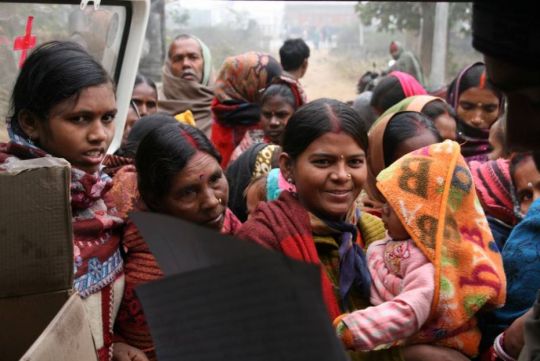
MAITRI paramedical staff member Arun disbursing supplements to pre and post-natal mothers during a Child Mobile Clinic, south of Bodhgaya, India, January 2018. Photo by Phil Hunt.
Phil Hunt, coordinator of FPMT probationary project Enlightenment for the Dear Animals, writes about his visit in early 2018 to FPMT project MAITRI Charitable Trust in Bodhgaya, India. These organizations are examples of one of FPMT’s Five Pillars of Service, Social or Community Service. This is a short excerpt from Phil’s recently published online story, “MAITRI Charitable Trust: Service in the Land of Noble Truths.”
Heading out at dawn through the outskirts of Bodhgaya on one of MAITRI Charitable Trust’s regular Mother & Child mobile clinics, I could quietly witness the pollution and poverty all too apparent at the edges of towns and the main roads.
It’s not the romantic image one would like to have of the place where the Buddha walked and taught all those years ago. Bodhgaya is in Bihar, and Bihar has one of the highest incidences of leprosy, TB, and infant mortality, and one of the lowest literacy rates in India.
The work that MAITRI does is not romantic either. Identifying people with leprosy, cleaning and dressing ulcers in flesh damaged due to localized deadening of the nerves, identifying people with tuberculosis (TB), collecting and analyzing sputum samples, assisting undernourished TB patients, or prenatal mothers, or newborn babies, and treating injured, maimed, and sick animals that have nowhere else to go. …
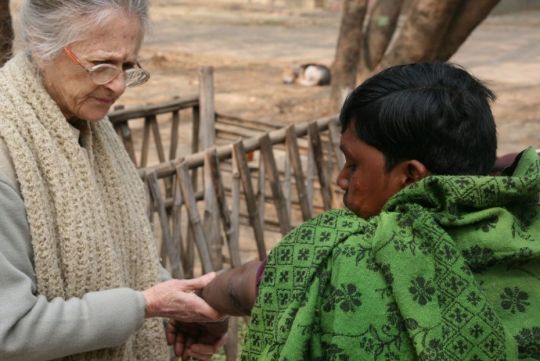
MAITRI director Adriana Ferranti reviewing a new leprosy case, MAITRI Charitable Trust, Bihar, India, January 2018. Photo by Phil Hunt.
Looking around Bodhgaya and surrounding districts at the poverty and ignorance, how could you possibly think you could make any impact? Yet these are the sentient beings Buddhists have pledged to bring to enlightenment, that Christians go to serve following the example of Jesus, that the left side of politics works to uplift, that the right side of politics promises to benefit through a ‘trickle down’ economy. They are the global neighbors with whom we have responsibility to share the riches of the world fairly. Indeed, these are the beings that might have been our direct neighbors if our karma had been very slightly different. …
Read Phil’s full story, “MAITRI Charitable Trust: Service in the Land of Noble Truths,” and view more of his photos online:
https://fpmt.org/mandala/in-depth-stories/maitri-charitable-trust-service-in-the-land-f-noble-truths/
For more information about MAITRI Charitable Trust, visit their website:
http://www.maitri-bodhgaya.org/
FPMT.org and Mandala Publications brings you news of Lama Zopa Rinpoche and of activities, teachings, and events from over 160 FPMT centers, projects, and services around the globe. If you like what you read, consider becoming a Friend of FPMT, which supports our work.
- Tagged: adriana ferranti, bodhgaya, community-social service pillar, maitri charitable trust, phil hunt
26
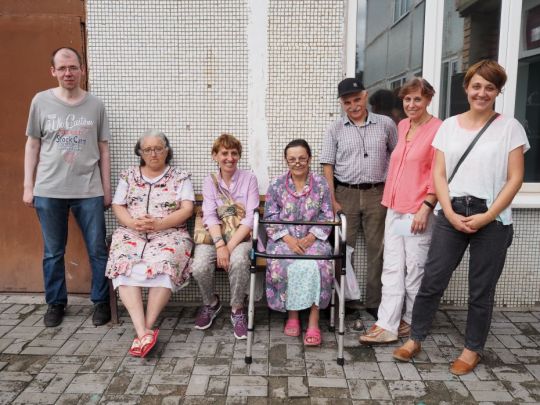
Visiting the nursing home, Dmitrovskiy Pogost village, Russia, July 2018. Photo by Anastasia Alekseevna.
Social or Community Service is one of FPMT’s Five Pillars of Service.
Five years ago a group of volunteers from FPMT center Ganden Tendar Ling Center in Moscow, Russia, asked what they could do for Old and Happy, a nonprofit that helps Russian nursing homes. As a result Ganden Tendar Ling Center volunteers began traveling 150 km (93 miles) to Dmitrovskiy Pogost village once per month to spend a day visiting friends in a nursing home. Anastasia Alekseevna, the center’s spiritual program coordinator, shares this about their July 2018 visit.
Our friends who live in the nursing home in Dmitrovskiy Pogost village don’t have any relatives or live in the nursing home because they need to be taken care of permanently. Some have children, but the children either live in other cities, have died, or can’t take care of their parents.
All of our friends in the nursing home have had a very hard life. Some are very sick and some feel alone or depressed.
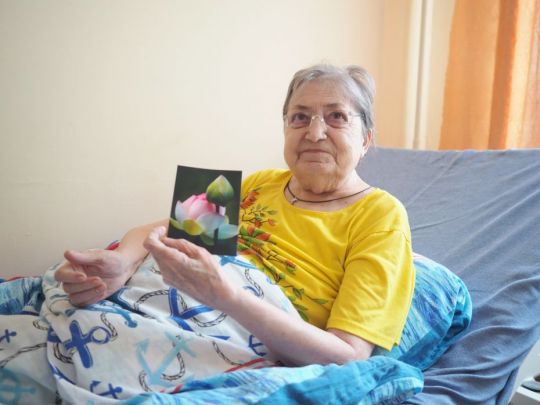
Visiting the nursing home, Dmitrovskiy Pogost village, Russia, July 2018. Photo by Anastasia Alekseevna.
We go to Dmitrovskiy Pogost village each month to meet our friends there and to bring them gifts. We buy all sorts of useful things such as shampoo, shower gel, soap, adult diapers, wet wipes, shaving accessories, and alcohol wipes for injections. We also bring magazines, books, crossword puzzles, and many sweets and fruits. We also celebrate our friends’ birthdays by wishing them “happy birthday” and bringing them gifts.
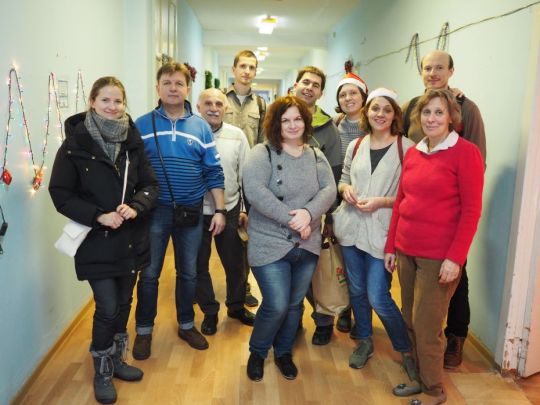
Visiting the nursing home, Dmitrovskiy Pogost village, Russia, December 2018. Photo by Anastasia Alekseevna.
But the most important thing is that we share kindness and compassion. With some of our friends we have a conversation and with others we cry or just hold hands. Our love and kindness are the medicine for these people.
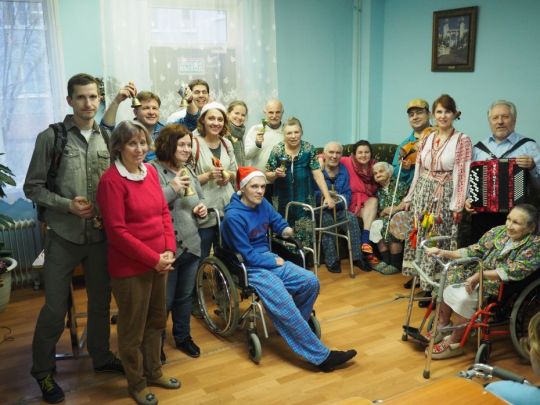
Visiting the nursing home, Dmitrovskiy Pogost village, Russia, December 2018. Photo by Anastasia Alekseevna.
Before every visit to Dmitrovskiy Pogost village, we meditate or do Buddha Medicine practice. After our visit we dedicate the merits. These visits are very useful and effective for our practice. We try to do it with open heart and mind.
For more information about Ganden Tendar Ling Center visit their website:
http://fpmt.ru
FPMT.org and Mandala Publications brings you news of Lama Zopa Rinpoche and of activities, teachings, and events from over 160 FPMT centers, projects, and services around the globe. If you like what you read, consider becoming a Friend of FPMT, which supports our work.
19
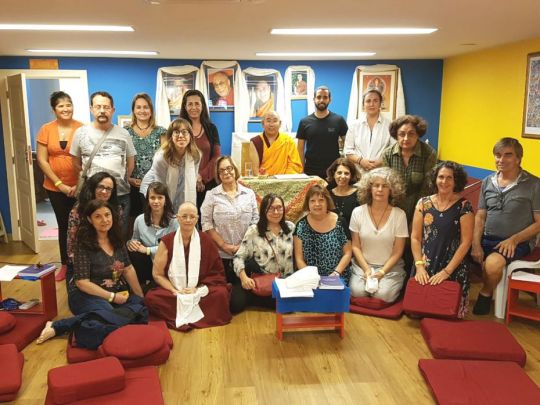
Geshe Lobsang Jamphel with students at Centro Shiwa Lha, Rio de Janeiro, Brazil, July 2018. Photo courtesy of Centro Shiwa Lha.
FPMT center Centro Shiwa Lha in Rio de Janeiro, Brazil, hosted Geshe Lobsang Jamphel, abbot of Nalanda Monastery in France, in July 2018. Ruth Saldanha, event production volunteer, shares the details of Geshe Jamphel’s visit.
Geshe Jamphel graciously accepted our invitation to teach Chapters 1 and 2 of Bodhicharyavatara (A Guide to the Bodhisattva’s Way of Life) over the course of two weekends in July.
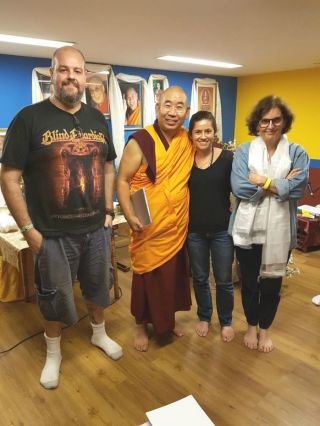
Geshe Lobsang Jamphel with volunteers Marcio Saraiva, Nakedia Carvalho, and Ruth Saldanha at Centro Shiwa Lha, Rio de Janeiro, Brazil, July 2018. Photo courtesy of Centro Shiwa Lha.
This is a text that has been studied since the eighth century, when it was written by the Indian scholar Shantideva (Shiwa Lha in Tibetan). It’s a classic of Buddhist philosophy studied by all schools of Tibetan Buddhism.
We were expecting Geshe Jamphel to give teachings on the last two weekends of the school holiday, July 21-22, and July 28-29. These were Saturdays and Sundays. But luckily for us, he decided to teach on the Fridays, too.
Centro Shiwa Lha recently moved to a listed 19th-century house, which was renovated and recently opened as the new home of the center. The value of our new place is that activities can be accommodated more comfortably.
We have a new meditation room that holds about sixty people. We even have a small yard with trees and a lawn. Upstairs are guest accommodations. We hope to be able to host a resident teacher soon.
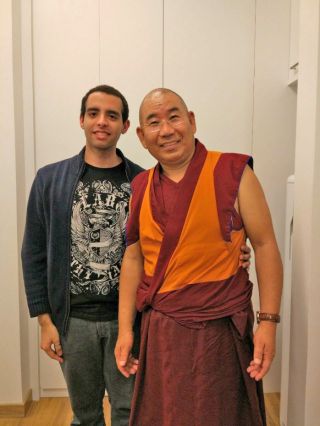
Geshe Lobsang Jamphel with Yuri Pinto at Centro Shiwa Lha, Rio de Janeiro, Brazil, July 2018. Photo courtesy of Centro Shiwa Lha.
We had a wonderful retreat with Geshe Jamphel, attended by twenty-five students. In addition to helping us absorb the meaning of the path to enlightenment, Geshe Jamphel told us the story of Shantideva.
His words were translated from Tibetan into Portuguese by Susana Montero. In this way we could hear the melodious sound of the Tibetan language. It had a special meaning to us since our center is named after Shantideva.
The lessons were given on Chapter 1 (Bodhichitta), and Chapter 2 (Confession). Geshe Jamphel also gave a talk on “Leading a Meaningful Life.” He offered refuge vows and a White Manjushri empowerment during the red moon eclipse.
We are so fortunate to have him come here for the second year in a row.
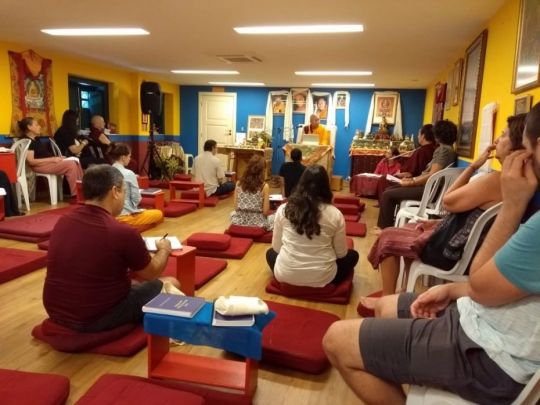
Geshe Lobsang Jamphel teaching students at Centro Shiwa Lha, Rio de Janeiro, Brazil, July 2018. Photo courtesy of Centro Shiwa Lha.
For more information about Centro Shiwa Lha visit their website:
https://shiwalha.org.br/
To watch Geshe Jamphel’s teachings visit Centro Shiwa Lha’s YouTube channel:
https://www.youtube.com/channel/UCOkh7XIVXcJX6jzIig3T4zg
FPMT.org and Mandala Publications brings you news of Lama Zopa Rinpoche and of activities, teachings, and events from over 160 FPMT centers, projects, and services around the globe. If you like what you read, consider becoming a Friend of FPMT, which supports our work.
15
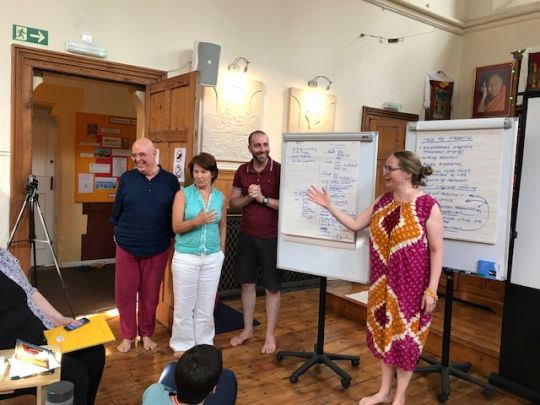
Foundation Service Seminar, Jamyang Buddhist Centre, London, UK, August 2018. Photo by retreat participants.
The Foundation Service Seminar (FSS) is the “FPMT immersion retreat.” It provides essential information and nourishment for all serving, or wishing to serve, in the FPMT organization.
The FSS Retreat is key to deeply understanding the FPMT organization and the attitude we seek to cultivate as we offer service in the organization. This experiential retreat helps us actualize the advice that service is practice, practice is service, and how to always enjoy and rejoice when offering service.
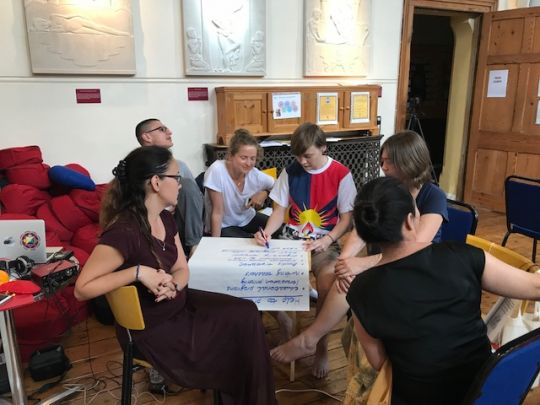
Foundation Service Seminar, Jamyang Buddhist Centre, London, UK, August 2018.
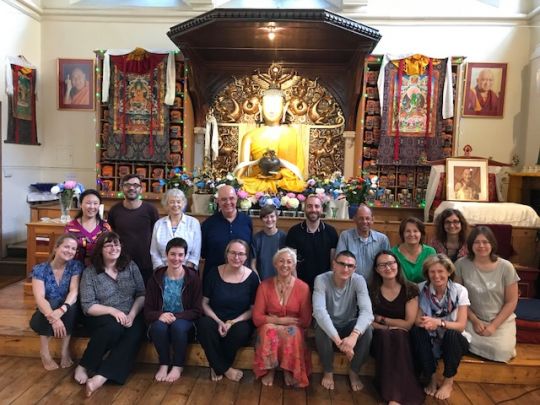
Foundation Service Seminar, Jamyang Buddhist Centre, London, UK, August 2018.
Sixteen FPMT students from across Europe graduated from the most recent FSS, held at Jamyang Buddhist Centre in London, UK, from August 3-8, 2018.
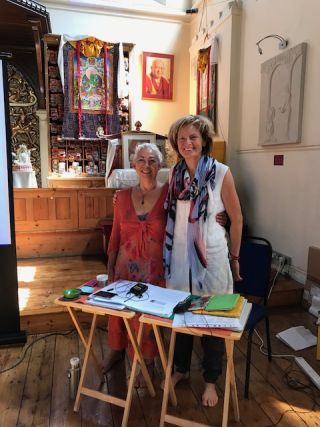
Foundation Service Seminar, Jamyang Buddhist Centre, London, UK, August 2018.
The retreat was facilitated by Charlotte Elliott and Annelies van der Heijden.
Charlotte said of the retreat, “The group dynamic was great. As one person mentioned, we started as strangers, but soon formed into an FPMT family.”
Annelies added, “Is was a great joy, pleasure, and honor to share all of my FPMT experiences with very sincere devoted students—some from afar—who took so much time, and made such a big effort to join and participate with great enthusiasm in our FSS. This was moving and very inspiring to me.”
The sixteen graduates also enjoyed the retreat, adding the following remarks:
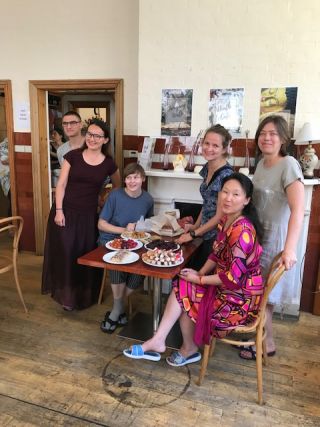
Foundation Service Seminar, Jamyang Buddhist Centre, London, UK, August 2018.
“I was very impressed by the information presented. I could never have imagined how big and beautiful the FPMT organization is!”
“It was inspiring to see and feel that we are many changemakers in FPMT, using our skills to build up a culture of compassion and peace, and benefit others.”
“It was enjoyable and informative, giving a valuable and rare opportunity to connect with others offering similar service.”
“It has helped me understand my role in the organization, and how I can better integrate my spiritual journey with service in the center.”
“I recharged my spiritual batteries.”
For more information on the Foundation Service Seminar and to find out how to register for future events, visit the FPMT Service Seminar webpage:
https://fpmt.org/education/training/
Lama Zopa Rinpoche is the spiritual director of the Foundation for the Preservation of Mahayana Tradition (FPMT), a Tibetan Buddhist organization dedicated to the transmission of the Mahayana Buddhist tradition and values worldwide through teaching, meditation, and community service.
- Home
- News/Media
- Study & Practice
- About FPMT Education Services
- Latest News
- Programs
- New to Buddhism?
- Buddhist Mind Science: Activating Your Potential
- Heart Advice for Death and Dying
- Discovering Buddhism
- Living in the Path
- Exploring Buddhism
- FPMT Basic Program
- FPMT Masters Program
- FPMT In-Depth Meditation Training
- Maitripa College
- Lotsawa Rinchen Zangpo Translator Program
- Universal Education for Compassion & Wisdom
- Online Learning Center
- Prayers & Practice Materials
- Overview of Prayers & Practices
- Full Catalogue of Prayers & Practice Materials
- Explore Popular Topics
- Benefiting Animals
- Chenrezig Resources
- Death & Dying Resources
- Lama Chopa (Guru Puja)
- Lama Zopa Rinpoche: Compendium of Precious Instructions
- Lama Zopa Rinpoche: Life Practice Advice
- Lama Zopa Rinpoche Practice Series
- Lamrim Resources
- Mantras
- Prayer Book Updates
- Purification Practices
- Sutras
- Thought Transformation (Lojong)
- Audio Materials
- Dharma Dates – Tibetan Calendar
- Translation Services
- Publishing Services
- Teachings and Advice
- Find Teachings and Advice
- Lama Zopa Rinpoche Advice Page
- Lama Zopa Rinpoche: Compendium of Precious Instructions
- Lama Zopa Rinpoche Video Teachings
- ༧སྐྱབས་རྗེ་བཟོད་པ་རིན་པོ་ཆེ་མཆོག་ནས་སྩལ་བའི་བཀའ་སློབ་བརྙན་འཕྲིན།
- Podcasts
- Lama Yeshe Wisdom Archive
- Buddhism FAQ
- Dharma for Young People
- Resources on Holy Objects
- Ways to Offer Support
- Centers
- Affiliates Area
- Teachers
- Projects
- Charitable Projects
- Make a Donation
- Applying for Grants
- News about Projects
- Other Projects within FPMT
- Support International Office
- Projects Photo Galleries
- Give Where Most Needed
- FPMT
- Shop
Subscribe to FPMT News
Translate*
*powered by Google TranslateTranslation of pages on fpmt.org is performed by Google Translate, a third party service which FPMT has no control over. The service provides automated computer translations that are only an approximation of the websites' original content. The translations should not be considered exact and only used as a rough guide.The reason we are unhappy is because we have extreme craving for sense objects – samsaric objects – and we grasp at them. We are seeking to solve our problems, but we are not seeking in the right place. The right place is our ego-grasping.






